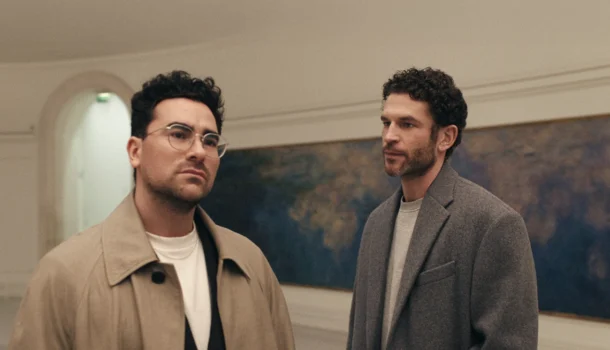There is a particular kind of silence that only echoes after the rupture of an emotional symbiosis. When two lives intertwine so deeply that identity and purpose become blurred, the absence of one does not leave a void — it breeds disorientation. Dan Levy’s feature directorial debut does not aim to narrate a tale of grief, but rather to dissect the anatomy of a coexistence that, once extinguished, leaves more than longing: it leaves fragments of a self that no longer recognizes itself alone. In this context, the protagonist, played by Levy himself, does not merely seek to move on after his husband’s death — he strives to understand who he has become after the end.
The film does not rely on overt lamentations nor does it chase hurried resolutions to pain. Instead, it delves into the discomfort of remaining. Marc, the central character, inhabits a suspended time between what no longer is and what has yet to become. His interactions with Sophie, a costume designer with a pragmatic soul, and Thomas, an emotionally drained art curator, offer no solace, only resistance. They orbit Marc’s drama without revolving around his pain, imposing emotional boundaries that challenge the usual rhetoric of unconditional support. This subtle refusal to provide immediate relief tightens the bonds and turns each scene into a trial ground for relationships that, under other circumstances, would seem unbreakable.
The narrative shift occurs when Marc, pressured by the looming expiration of a lease for an apartment in Paris he never knew existed, is forced to confront a letter left by his husband before dying. This letter, unread for months, is not a farewell but a document of rupture: the revelation that the seemingly perfect relationship concealed silent desires and escapes. The existence of a second home, shared with another man, exposes the illusory nature of the certainties Marc held onto. Rather than bringing peace, the letter triggers a new wave of emotional deconstruction.
By choosing not to immediately disclose the truth to his friends, Marc embarks on an ambiguous journey, both literal and symbolic. He invites Sophie and Thomas to spend a weekend at the Paris apartment, pretending familiarity with the place. There, within walls filled with memories that are not his, he seeks to uncover the face of the lover he never imagined existed. Discovering that it was a younger dancer does not evoke the expected outrage, but instead leads him into the complexity of human motivations. The betrayal here is not punishment, but enigma: what drives someone to conceal such a significant part of their life, even from the one they claim to love?
As Marc struggles to grasp the extent of the lie he lived, the film unfolds as a study of the fractures that pervade the most intimate bonds. The dialogues, dense and winding, act as duels disguised as confessions, exposing frustrations that go beyond the main narrative. The stay in Paris becomes a laboratory of raw emotional relationships, where each character reveals the invisible weight they bear — not only for Marc, but for themselves. Sophie, steeped in her skepticism, and Thomas, on the brink of exhaustion, do not escape their own contradictions, and it is within this tangle of conflicting feelings that the film finds its dramatic core.
Dan Levy chooses a tone that refuses easy solutions. The discomfort evoked by his feature lies in the deliberate absence of full closure. There is one grief layered over another — the grief of loss and of discovery — and both coexist without hierarchy. The love that sustained Marc was not a lie, but neither was it whole. What remains, then, is the ambiguity of having been loved by someone who no longer wanted him entirely. This nuance, rarely portrayed with honesty, is what sets Levy’s vision apart: it is not about consoling the audience, but about urging them to face what is most unsettling in love stories — their impermanence.
The film leaves a trail of unease that finds no resolution in catharsis. It demands not passive empathy from the viewer, but a willingness to confront what is unspeakable in the experience of loss. Rather than offering a soothing conclusion, the director builds an ending that pulses in its incompleteness: the certainty that some wounds never heal — they just stop bleeding every day.
Film: Good Grief
Director: Dan Levy
Year: 2023
Genres: Drama/Comedy
Rating: 8/10

